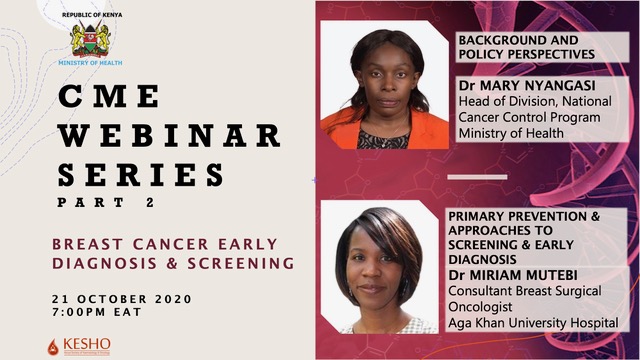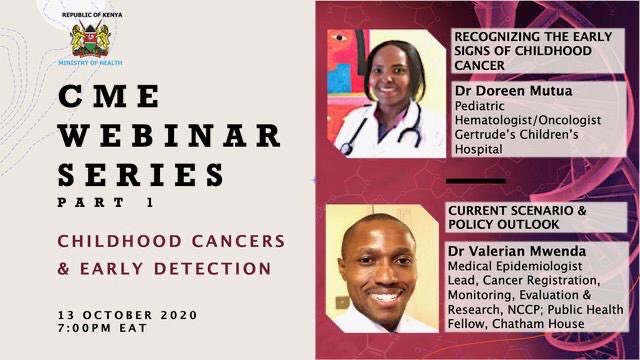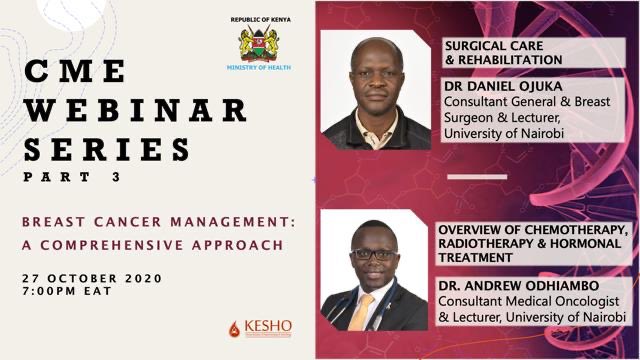
- This event has passed.
Breast Cancer Early Diagnosis and Screening Part 2
Event Navigation

Moderator: Dr. Vera Manduku Presenters:
- Dr. Mary Nyangasi, Head of Division, National Cancer Control Program, Ministry of Health, Kenya
- Dr. Miriam Mutebi, Consultant, Breast Surgical Oncologist, Aga Khan University Hospital
The ministry of health is commemorating the annual national breast cancer awareness month 2020 by giving hope and saving the lives of breast cancer patients. Globally, cancer is a major cause of death, accounting for 1 out of 6 deaths annually. Over 70% of deaths occur in low and middle-income countries, where breast cancer accounts for 6.6% of all cancer deaths. In Kenya, cancer is the second leading cause of death from non-communicable diseases, accounting for 7% of overall mortality. Breast cancer is the third leading cause of death after esophageal and cervical cancers. Good prognosis is associated with timely screening and early detection, followed by timely treatment. Unfortunately, awareness and uptake of screening services remain low in Kenya. Consequently, 70% of breast cancer cases are diagnosed in advanced stages. Since survival of breast cancer patients is highly dependent on the stage of diagnosis, a low survival rate is observed in stage IV patients. To support the management of breast cancer, the ministry of health, Kenya has put infrastructure for screening mammography in all the 47 County Referral Hospitals. In addition, the ministry has provided national cancer screening guidelines (2018) to guide an organized and unified approach for screening priority cancers including cervix, breast, colorectal, prostate, and retinoblastoma. Mammography is the recommended method of screening for women in the average-risk population, and the only screening modality shown to reduce breast cancer mortality. Previous studies have shown that screening mammography helps with the early detection of cancer and greatly reduces breast cancer deaths for women aged 40-74 years as well as those above 74 years. However, mammography is very costly and is only recommended for countries with good health infrastructure that can afford long-term programs. Other early detection techniques include a clinical breast examination, ultrasound, monthly breast self-examination, and breast self-awareness. Breast cancer management in low and middle-income countries is complicated by poor health systems, poverty, and retrogressive cultural practices. In these countries, awareness of early signs and symptoms and screening by clinical breast examinations are recommended for the early detection of breast cancer. In Kenya, screening is mainly opportunistic, mainly due to challenges associated with lack of equipment, radiologists, and radiology personnel. The risk of breast cancer is stratified into two: the average-risk population, accounting for 80%, while the high-risk population (20%). While there is a need for risk reduction strategies, the risks involved in mammography are non-lethal; hence screening benefits outweigh the risks involved. Some of the risks include recall for additional imaging, needle biopsy, false positives, anxiety, and over-diagnosis. Lifestyle and environmental factors can have an impact on breast cancer risk. Some of the risk reduction measures include maintaining a healthy weight, exercising regularly, and limiting the amount of alcohol.
Webinar Recording

